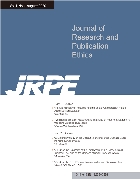- Log In/Sign Up
- E-ISSN2733-7146
- KCI Candidate
 E-ISSN : 2733-7146
E-ISSN : 2733-7146
Vol.2 No.1
Abstract
The aims of this study were to examine the causes and types of the most common and serious fraudulent authors among research misconduct, and to examine ways to reduce the mass production of unjust authors. In scientific research, it is universal and efficient to have multiple authors participate. This is because each author group consisting of a team has its own expertise, and most of them participate in research in a complementary way to maximize the research effect. However, the competition for achievements between researchers, the quantitative evaluation system of universities, and the social atmosphere of performance-oriented are tempting researchers to abandon research ethics. In this study, in relation to the research ethics of existing researchers, the contents of research ethics by a few countries such as United States, United Kingdom, Germany, Canada, Australia etc. and the situation in Korea was examined as well. In addition, the types and causes of domestic unfair authors in Korea were investigated intensively. In conclusion, in order to no longer produce unfair authors such as compulsory authors, honorary authors, mutually supported authors, and duplicate authors, which researchers unknowingly recognize as co-authors, reinforcement of research ethics education and national organization and system should be supported.
Abstract
Purpose: The current study suggests that any errors and other inaccuracies noted in the research process should be appropriately communicated to the editorial offices. This will try to eliminate the mistakes that may undermine the value of the publication. The present research thus focuses on the ethical issues and concerns in the publication. Research design, data and methodology: A content analysis applied for this study is suitable because there exists enormous textual data in the realm of ethical concerns and issues in the publication process. The current study investigated manifest and critical themes regarding ethical concerns and issues for research publication. Results: Researchers should consider ethical principles based on suggestions of this study when carrying out a publication for the work to be acceptable in diverse regions and the journal should be made in account of completeness and ensure that all the relevant factors are considered to promote the research's accuracy. Conclusions: Ethical issues denote considerations and moral elements that should be considered by the authors while making a publication. They include Beneficence, which literacy means, do no harm, respect for confidentiality, and anonymity, which is about respecting the rights and dignity of subjects identified based on personal responsibility.
Abstract
Purpose: This paper aimed to examine the ethical considerations that are the basis for many functions in the healthcare field. The key ethical values in global health, as well as future considerations imperative to this area, were observed. Research design, data and methodology: The current study utilized the past literature studies that were examined in the field of global health. An overview of the role of ethics in the healthcare field, as well as important considerations that needed to be taken into account in order to provide advancements in this area, were investigated. Results: Ethics are an important set of principles that guides humankind into the right conduct or action to better society and each other. Ethical values are one of the pinnacle points for any healthcare provider, as healthcare is not only considered from the aspect of patient health and well-being, but also in its role of keeping ethical guidelines to achieve the best possible care for a patient. Conclusions: A comprehensive understanding of healthcare is needed in order to tackle next generational challenges in global health. These ethical considerations will inevitably play a significant role in harnessing the patient-healthcare professional relationships as well as care for the shortening of a global disparity on healthcare.
Abstract
Purpose: The purpose of this study is to check the direction of KODISA's pursuit of complex and convergence studies by confirming the research trends of KODISA's direct academic journals such as JDS, JIDB, JBEES and JAFEB. To this end, we tried to compare and confirm the research trends of the papers in four academic journals targeting keywords. Research Design, data and methodology: The analysis was conducted from 2014 to 2020 on 867 papers from JDS, 315 papers from JIDB, 120 papers from JBEES, and 867 papers based on the publication year of the most recently published journal from JAFEB. For the analysis, frequency analysis, word crowding, topic modeling, and frequency analysis by applying weights for each year group were performed on the keywords crawled using Python. Results: The results of frequency analysis showed that each journal is properly oriented toward its target direction. In addition, it was confirmed that the results of topic modeling significantly reflected the results of frequency analysis. Finally, it could be concluded that the results of frequency analysis using the weights of keywords by year group were also developing in the direction the target journals were analyzed. Specifically, in the case of JDS, 20 keywords such as Service Quality, Distribution were found to increase continuously according to the year group. Meanwhile, the keywords that continued to increase according to JIDB's year group were India, Social Capital, and Job Stress. The keywords that continued to increase according to the year group of JBEES were Micro Finance Institutions and Microfinance, and the keywords that of JAFEB were confirmed to be Vietnam and Service Quality. Conclusion: It was confirmed that KODISA's direct management journals responded appropriately to convergence issues. In particular, it was confirmed that researches in various fields of JDS are continuously increasing. However, it seems that JIDB needs to deal with various issues additionally in the service industry field and JBEES in the environment field. Finally, it was found that JAFEB needs to be wary of the relatively low level of interest in some countries such as Kazakhstan and India in recent years.













